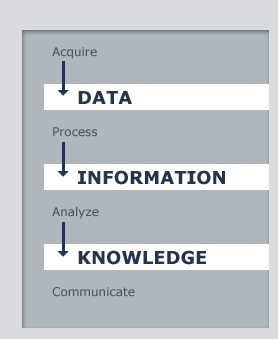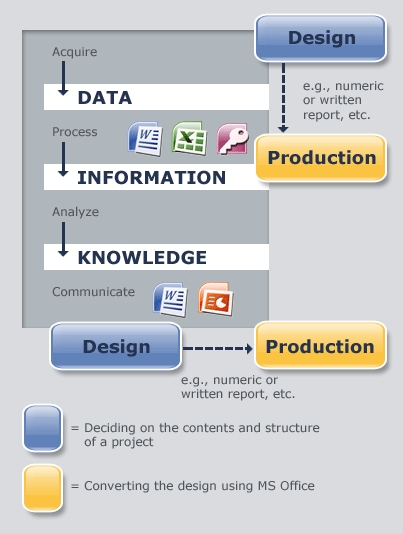Business Issue
KW Pro aims at raising Knowledge Worker Productivity. Initially, we will be focusing on Issues using Office Productivity Software.
Knowledge Worker Productivity
Today, knowledge and information are at the core of economic processes. The development and distribution of knowledge is of paramount importance for the creation of value. This is not least evident in the fact that more than 50% of the workforce is categorized as Information Professionals. Knowledge workers are people who predominantly work with their minds. They are concerned with the collection and processing of data which is converted into information through contextual interpretation and into new knowledge by combining it with existing knowledge.

- Figure 1
Raising the productivity of knowledge workers cannot be achieved by applying the same methods devised during the early industrial production where the main focus was on developing solutions for mass production and standardized processes, i.e., increasing the ratio of output to input. Instead, appropriate activities must be designed to increase the general performance of knowledge workers, in other words their effectiveness, efficiency, quality, satisfaction and innovativeness.
Issues using Office Productivity Software
One of the central initiatives to increase knowledge worker productivity focused on the introduction of Office Productivity Software. These packages typically include word processing, spreadsheet, presentation and database programs. The Microsoft® Office applications command a market share of more than 95% in this segment.

- Figure 2
There are three key reasons why the implementation of Office Productivity Software can only be called a partial success:
- Knowledge workers possess inadequate skills in using Office Productivity
Software.
The vast majority of Office Productivity Software users have got only limited knowledge of the available functionality; this applies in particular to the Excel® spreadsheet software. Functions which are used most frequently are those which can be accessed directly, e.g., the sum function from the respective icon on the standard toolbar. The least used functions are those which are perceived to be "difficult" or require some form of preparation, e.g., Pivot Tables - exactly those components of the software which promise the highest productivity increase.
It is in this situation that knowledge workers do not receive adequate support. Direct professional help, e.g. through Help Desks, is often not available - or not any more. Typical professional development programs, most often in the form of seminars, are largely ineffective:- Trainings take place at predetermined times and not when issues crop up.
- The content of seminars is not tailored to individual needs and, therefore, often redundant or not relevant.
- Exercises used in training are too general and not linked to actual problems.
- Different learning styles and paces are difficult to accommodate.
- Newly acquired knowledge is easily forgotten considering the oftentimes long delay between the seminar and subsequent application on the job.
- Knowledge workers spend a long time
using Office Productivity Software even though this activity is not part
of their core responsibilities.
In the wake of cost-cutting initiatives, the number of employees whose core responsibilities include the creation of spreadsheets, presentations, etc. with Microsoft® Office applications has been consistently reduced over the last years. In addition, the need for information is further increasing and requests are becoming more and more complex. As a result, knowledge workers with higher or different qualifications are forced to take over these tasks - even though they neither have the required skills nor the necessary time. Consequently, as these knowledge workers are distracted from their core responsibilities their effectiveness – and therefore their productivity as well – decreases significantly. - Knowledge workers do not possess adequate skills in the systematic
development of knowledge.
Many knowledge workers have not received the necessary training to follow a systematic approach in the development of knowledge (compare Figure 1):- A clear objective is frequently not defined.
- Shortcomings exist in transforming information into knowledge:
- Available information is oftentimes not put into context (e.g., compared with relevant benchmarks).
- Sufficient action alternatives are not developed.
- The amount of information is not reduced to a manageable level.
- Most knowledge workers lack the experience to effectively structure and communicate the newly created knowledge - probably the most important step.

